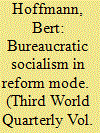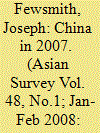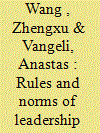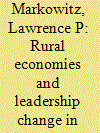| Srl | Item |
| 1 |
ID:
148267


|
|
|
|
|
| Summary/Abstract |
Standard wisdom explains Cuba’s current transformation as one of economic change but political immobility. However, Cuban politics have also undergone a major change since the handing over of power from Fidel to Raúl Castro – even if the rhetoric used has been one of continuity. This article traces this process by looking at four areas: the depersonalisation and re-institutionalisation of the political structures; the diversification of the public sphere, particularly through the use of digital media; the liberalisation of travel and migration, with its transformative impact on state–citizen relations; and the turn to a moderate foreign policy, as highlighted by the rapprochement with the USA, with its implications for legitimising the underpinnings of Cuban socialism. Although the shift has been well below the threshold of a transition to multiparty democracy, Cuba has evolved from the charismatic model of the past to what can be understood as bureaucratic socialism in reform mode.
|
|
|
|
|
|
|
|
|
|
|
|
|
|
|
|
| 2 |
ID:
081863


|
|
|
|
|
| Publication |
2008.
|
| Summary/Abstract |
In 2007 China was dominated by politics, specifically the preparations and negotiations heading into the Seventeenth Party Congress, which was held in late October. General Secretary Hu Jintao was successful in having his "scientific development concept" written into the Chinese Communist Party Constitution but was not allowed to name his own successor
|
|
|
|
|
|
|
|
|
|
|
|
|
|
|
|
| 3 |
ID:
145795


|
|
|
|
|
| Summary/Abstract |
Under Deng Xiaoping, the Chinese Communist Party started to institutionalize leadership succession in the 1980s. Peaceful and orderly succession of the top political offices, however, only started to take shape in the early 1990s. We identify three sets of rules and norms formed since then to govern elite replacement and power succession. These concern top leaders’ exit from power, selection of successors, and the transition of power between outgoing and incoming leaders. We trace the evolving process in which these rules were made and accepted by the Party elite between 1992 and 2012. Incidents, however, also showed the malleability of some of these rules and the potential rise of ambitious rule challengers. Into Xi Jinping’s era, uncertainty still threatens the revision or abandonment of some of these rules, and continuous attention is needed in order to understand the likely trajectories of the Chinese political system.
|
|
|
|
|
|
|
|
|
|
|
|
|
|
|
|
| 4 |
ID:
149737


|
|
|
|
|
| Summary/Abstract |
This article applies a political economy approach to questions of presidential succession in Central Asia. Using the cases of Uzbekistan and Kyrgyzstan, it examines how institutions governing rural economies generate, channel and distribute rents within these authoritarian regimes. In some, these institutions concentrate rents under long-standing rulers; in others they diffuse rents away from rulers. The article then specifies obstacles to leadership change that arise from these rural economies, and the crises those obstacles may pose for authoritarian regimes in the region.
|
|
|
|
|
|
|
|
|
|
|
|
|
|
|
|
| 5 |
ID:
178668


|
|
|
|
|
| Summary/Abstract |
Under what conditions can dictatorships manage peaceful leadership transitions? This article argues that constitutional succession rules are critical for modern dictatorships, contrary to the predominant scholarly focus on hereditary succession or parties. An effective succession rule needs to solve dual problems of peaceful exit and peaceful entry. First, the rule must enable incumbents to exit power peacefully by reducing coup threats. Second, the rule must empower the designated successor to ensure that they can enter power peacefully. Constitutional rules help solve both problems, and are particularly effective when they appoint the vice president as the designated successor. The vice president’s access to material resources deters other factions from challenging the succession procedure, whereas designating successors without a power base is ineffective. Using original data on constitutional rules in African autocracies, I show that regimes that formally designate the vice president as the successor are more likely to undergo peaceful transitions.
|
|
|
|
|
|
|
|
|
|
|
|
|
|
|
|